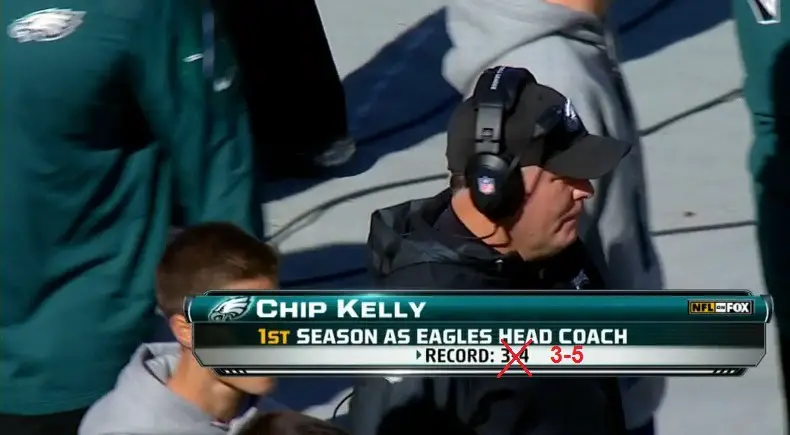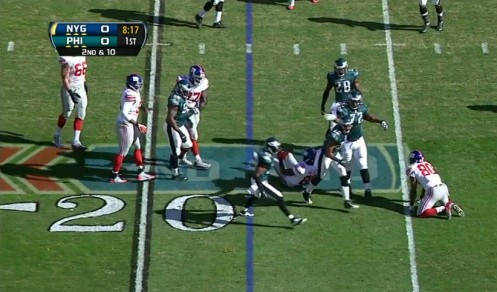from Video
Four weeks ago, I thought the Eagles had hit rock bottom with their 52-20 loss to Denver. If only . . .
Part of that was the schedule. They had just lost to the dominant Broncos, the (still undefeated) Chiefs and the surprising Chargers. Ahead was a parade of cream puffs: the Giants, Tampa Bay, Dallas (less so), the Giants again and the Oakland Raiders. I figured the Birds were good to win three or even four of those five games, and would be favored against all except Dallas. I was wrong.
Michael Vick got injured. Then Foles got injured. The Giants got a little better, enough to win against the Eagles’ third string quarterback, and the Raiders got a lot better. So far Philadelphia is 2-2 over the easiest chunk of their schedule, and they are expected to lose Sunday in Oakland (though I’m predicting an upset).
None of this has unfolded the way it was expected. The Eagles’ defense was written off for the year by all concerned, but it has actually tightened up a great deal. They have held their last four opponents to 21 or fewer points. Sure, three of them suck on offense, but the Cowboys brought the league’s second-best scoring machine to Lincoln Financial Field and left with just 17 points. Only Kansas City’s dominating defense has held them to fewer points (16); against non-Eagle teams (including the Chiefs), Dallas averages more than 30 points this year.
The defensive line has looked so well that the team traded starting nose tackle Isaac Sopoaga and a sixth round draft pick to New England for a fifth rounder. A big and experienced veteran picked up in free agency, Sopoaga played a valuable role at the beginning of the season, anchoring the Eagles’ front line as they shifted radically from Andy Reid’s Wide 9 front to a 3-4 defense. No doubt he passed on a lot of knowledge to the team’s younger players, but his own play was unremarkable at best. More to the point, rookies Bennie Logan and Damion Square and 3rd-year trade pickup Clifton Geathers have played so well that the coaches needed to make room for them to play.
The Eagles now have a talented front line that is the youngest in the league; the oldest player is 25. It’s a great building block for Chip Kelly’s program. They’re still desperate for depth at cornerback, better scheme fits at linebacker and anything they can get at safety, but that front line is now the most solid part of this team, against all predictions.
Simultaneously, though, Philadelphia’s offense has fallen apart. How badly? They were averaging 27 points a game two weeks ago, and have scored a total of three offensive points in the two games since then. THREE. (Specials teams trivia answer Najee Goode outscored the Eagles’ offense 2-1 over that stretch, just by picking up a wild snap on a New York Giants punt attempt and falling forward 2 yards into the end zone.) That is astonishingly bad production.
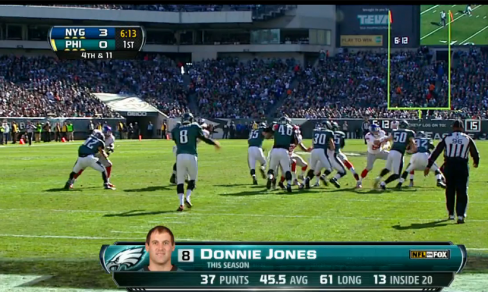
The Eagles’ MVP: punter Donnie Jones.
There are a number of interlocking problems. Teams are collapsing on LeSean McCoy and playing tight man coverage on DeSean Jackson; the big picture is that the team hasn’t found a way to punish this strategy. Those two stars each gave up a first down against the Giants by trying tricky horizontal evasion instead of running straight ahead and grinding out an extra yard or two. In each case they were stopped just short of the first down, and that has to stop.
The injuries and inconsistent play at quarterback are the biggest factor in the offensive collapse. Matt Barkley is playing like, well, a rookie picked in the fourth round. He’s actually moving the ball well, better than Foles did against Dallas certainly, but he has four interceptions, three fumbles and two dropped snaps out of 49 snaps, while playing three out of the last eight quarters. Given his clear ability to hit receivers, I’m hoping that this is simply him slowly learning how much faster NFL defenders are; if so, he’ll have a chance to grow into a decent QB. But Nick Foles is starting against Oakland, and he has the opposite problem. He’s been great at avoiding turnovers, but very erratic at putting footballs into the hands of wide-open receivers. Unless he figures out how to be more consistent, it will be painful to watch him take snaps, and Vick looks to be injured for weeks to come.
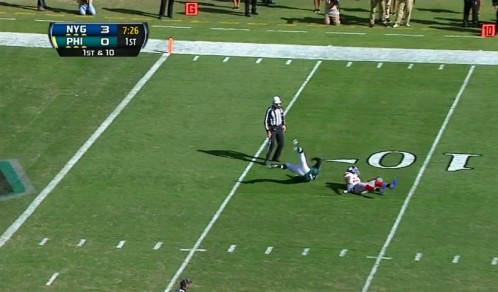
Micheal Vick, immobile, gets sacked, fumbles and recovers.
Kelly himself deserves part of the blame. He made some more questionable strategy calls, especially against the Giants. The worst was just before halftime. Vick had left the game after re-injuring his hamstring, and Nick Foles had not returned from his concussion against the Cowboys. (Incidentally, we learned that Nick was knocked out cold on the play that drove him from that game.) So third-string rookie Matt Barkley came in and drove the team down to the Giant’s two-yard line.
The coach had multiple mistakes that came into play here, actually. He had not given Barkley any first team reps in practice that week, despite Vick’s lingering injury and Foles’ absence. After the first down at the two, Kelly called time out. Now at Oregon, he would have gone high-tempo with a quick snap to run it in, while the defense was still stunned by the big gain, and it looks like he should have done the same here. Instead of a read option with Shady, Barkley and a screen as possibilities, he called time out “to settle Barkley down.” Then he called a simple pass play, QB rolling out, just two possible targets, throw it away if you don’t see anything. Except Barkley didn’t throw it away, and the Giants’ Terrell Thomas stripped him from behind. The fumble was recovered by New York, and Philadelphia entered the locker room down 12-0 instead of 12-7.
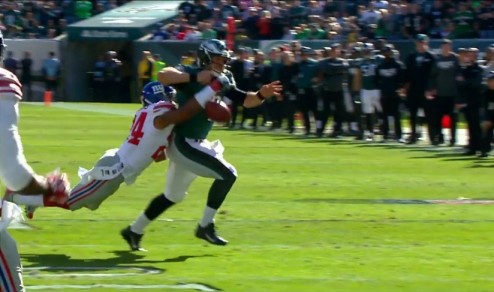
Mark Barkley is strip-sacked by Terrell Thomas,
There were other odd calls, too. On 4th-and-10 at the Giants’ 32, Chip went for it; but on 4th-and-4 at midfield, trailing 15-0, he punted. Standard strategy would have suggested a field goal and going for it respectively, and it’s hard to see what Chip’s unconventional approach added.
Now, to be fair, there is a lot of evidence that Chip’s offense is still creating good opportunities, and his quarterbacks just aren’t taking advantage of them. Here’s where it gets tricky to figure out what to do. A coach can’t make a bad quarterback great, but it’s also his job to make the most of decent but flawed players, and Chip has three to run his offense.
I think Bill Barnwell said it best at Grantland: Chip is learning that he has much less room for error in the pros, especially at quarterback. A marginal talent like Dennis Dixon or Darron Thomas isn’t good enough here.
At the professional level, the windows Kelly’s offense creates are smaller, and the decision-making his quarterback needs to perform has to be done faster and more reliably than the speed at which his current options operate. Foles misses too many big plays. Vick holds on to the ball too long and isn’t accurate. Barkley is a project at best.
I think most Ducks’ fans know who the perfect quarterback for the Eagles would be, but he’s only a sophomore right now, and even if he does go pro, the Eagles would have to trade a lot to have the first or second pick they’ll need to get him. Anyway, Mariota is too busy preparing for the Stanford game to worry about that now.
In the meantime, the Eagles play the resurgent Oakland Raiders on the road this week, and now that they’re on the West Coast, I’ll be there in the press box to tell you about it. (Portland to Philadelphia or Tampa Bay is a rough commute.) Chip may still be haunted by the ghost of Terrelle Pryor, who ruined the Ducks’ 2009 Rose Bowl appearance. We’ll see if the talented but erratic Pryor — now starting for Oakland — is a trick or a treat for Chip this time around.
Mark Saltveit’s best-selling book “The Tao of Chip Kelly” has received rave reviews from coaches, players and sportswriters since its release in June. You can find it at the Oregon Ducks Stores in Portland, Eugene and Bend, at Powells Books, at the Multnomah Athletic Club M-Porium in Portland, various bookstores in Pennsylvania and New Hampshire, and online at http://www.chipkelly.tv/
Related Articles:
Chip Kelly Update: Everything's Good Again ...
Chip Kelly Update: Wailing and Gnashing of Teeth
Shock and Awe -- The Oregon Ducks' Football Hangover Effect
Despite Lopsided Score, Georgia State "Never Stopped Believing"
Hope Springs Eternal for Ducks
Incompetent Pac-12 Officials: How Do You Miss ALL of THIS?
Mark Saltveit’s newest book is “Controlled Chaos: Chip Kelly’s Football Revolution” (Diversion Books, NY) has been recently released. He is the author of “The Tao of Chip Kelly” (2013) and writes on science, religion, wordplay and political scandals. He is also a standup comedian and the world palindrome champion.

